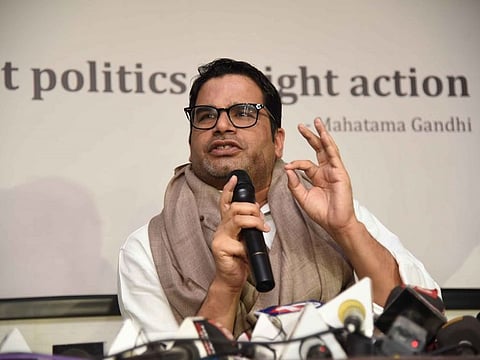Prashant Kishor has only one challenge in India, and he’s up for it
Throwing the ruling BJP a challenge at national level is both audacious and bold

India’s first American-style political consultant has become a larger than life figure after pulling off an incredible election victory in West Bengal.
Where most people thought the BJP would win, Kishor stuck his neck out and said the Bharatiya Janata Party (BJP) wouldn’t even get 100 of 294 seats. The BJP won 77.
The BJP’s defeat in West Bengal may have been the good fortune of Mamata Banerjee and her Trinamool Congress, but did it change much for national politics?
To assert that the BJP is still on the heavier side of the balance of power, the Central Bureau of Investigation had 4 ministers of Mamata Banerjee’s cabinet arrested under corruption charges.
The Bengal defeat for the BJP came along with another, bigger piece of bad news: the second wave of COVID-19, widely blamed on the central government’s negligence.
And yet surveys showed the popularity ratings of Prime Minister Narendra Modi went down only a bit. If national elections were to be held today, nobody thinks the BJP could lose.
A strong challenge
In state elections, opposition parties, even the Congress, is able to give the BJP at least a strong challenge. You see the BJP lose elections like Bengal, but even when the BJP wins, as in Bihar 2020, those are not cakewalk victories. The BJP’s vote-share tends to fall substantially between national and state elections in almost every state.
These state election victories or defeats don’t seem to change too much for the national fortunes of the BJP. That’s because there is no national opposition to the BJP.
The Congress party’s odd protest against exorbitant fuel prices is a forgettable one-day affair. Regional parties have given up on national politics, too busy saving their votes from the BJP on their home turf.
The Communist parties, despite retaining Kerala, don’t matter nationally the way they used to. The Aam Aadmi Party, once again punching above its weight and trying to win states other than Delhi, is also not doing any national posturing. From Rahul Gandhi to Arvind Kejriwal, every politician sees Indian politics as a series of state elections.
Before 2014, that was the prevailing consensus: Indian politics is a sum of the states. But Modi showed there is a national imagination. When Modi speaks of “One Nation”, he’s asking voters to think separately of national and state politics.
In Uttar Pradesh in 2019, when the two major regional parties came together in a formidable coalition, BJP workers went door-to-door saying voters must think of India, not UP, since this was a national election.
Modi, the only national leader
The only party that does any national politics today is the BJP. The only real national leader is Narendra Modi. Rahul Gandhi’s presence is marked more by his absence.
This helps the BJP in state elections too, as the popularity of Narendra Modi becomes a factor for the local BJP. By contrast, the Congress party, looking limp nationally, becomes a liability for the Congress state units too.
Even if the BJP were to win the 2024 national elections, the country needs a strong national opposition. In the absence of any national challenge, the BJP could win not 303 but 403 seats next time, out of 543. The semblance of one-party rule does not make for a healthy democracy.
The way out of this conundrum is that somebody has to start doing national opposition politics without worrying about which state is going for polls next. Since nobody has been able to solve this problem for 7 years now, it is Prashant Kishor’s only challenge.
Kishor has already shown he has some ability to turn around difficult situations for opposition parties. He has had enough doubters, but those have been silenced after Bengal. Opposition supporters who used to say Kishor is ideologically suspect, or that he just picks winners, have nothing to say anymore.
Can Prashant take Modi-Shah on?
That leaves Kishor with only one impossible challenge: national politics. Most people think Narendra Modi is invincible, Amit Shah is the smartest political strategist, and so on. Can Prashant Kishor provide a national challenge to Modi-Shah?
Whether or not Kishor joins the Congress party is not the most important question here. The question is whether Kishor can fill the vast vacuum of opposition in national politics.
Whether that is to be done by reviving Congress, or by merging some regional parties to create a new national party, or uniting the opposition into a strong coalition, or by launching a social movement, or by launching an altogether new party — these are all ways to get there. And maybe getting there will need all of these.
Kishor has made it clear he does not want to be a consultant anymore, and it is obvious he wants to give being a politician a second try. The first try was when he joined the Nitish Kumar-led Janata Dal (United) before 2019. That didn’t end well, but what is pertinent here that it was also a regional party.
For Kishor, the only challenge worth accepting after delivering Bengal should be national politics. The good news is that he’s up for it.









